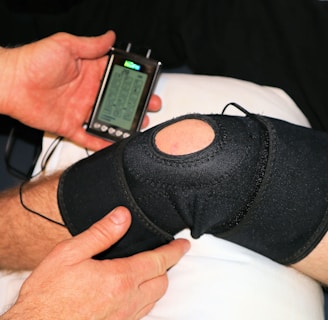The Daily Guide to Keeping Knees Healthy
Taking care of your knees is essential for maintaining an active and healthy lifestyle. Whether you are an athlete or simply looking to improve your overall well-being, keeping your knees in good condition is crucial. In this daily guide, we will explore some simple yet effective tips to help you maintain healthy knees for years to come.
FITNESS
7/19/20244 min read


Understand the Basics of Knee Health
Grasping the fundamentals of knee health is key to keeping this critical joint in top condition. The knee, a sophisticated structure, consists of bones such as the femur, tibia, and patella, cushioned by cartilage that allows for smooth movement. Ligaments and tendons play a crucial role in providing stability and flexibility, essential for motion and bearing the body's weight. An understanding of these components and their functions highlights the importance of preventive measures to avoid injury. Regularly engaging in exercises that strengthen the supporting muscles can safeguard the knee by enhancing its stability and reducing wear and tear. Additionally, being mindful of the knee's limits and avoiding activities that strain it excessively can prevent overuse injuries. By appreciating the complex nature of the knee joint, individuals are better equipped to adopt practices that support its health and longevity, ensuring that it continues to perform its vital role in everyday movement effectively.
Incorporate Low-Impact Exercises in Your Routine
Incorporating low-impact exercises into your fitness regimen is a proactive step towards safeguarding knee health. Activities like swimming, cycling, and walking are especially beneficial as they bolster the muscles surrounding the knee without subjecting the joint to harsh impacts. Engaging in these forms of exercise enhances muscle strength and joint flexibility, contributing to the overall resilience and health of the knees. Such activities not only keep the knees robust but also promote cardiovascular health, aiding in weight management which indirectly benefits knee health. Emphasizing the importance of variety, integrating a mix of these low-impact exercises ensures that the muscles around the knee are evenly strengthened, providing balanced support to the joint. Additionally, incorporating flexibility and stretching routines, such as yoga or Pilates, can further enhance joint mobility and reduce the risk of injury. By thoughtfully including these exercises in your weekly schedule, you can contribute significantly to the longevity and health of your knees, ensuring they remain strong and flexible for daily activities and beyond.
Maintain a Healthy Weight for Joint Ease
Excess weight significantly increases the stress and pressure on knee joints during daily activities and exercise, escalating the risk of wear and tear and potentially hastening the onset of joint-related issues. A balanced diet rich in nutrients and regular physical activity are pivotal in achieving and sustaining a weight that minimizes the burden on your knees. Incorporating whole foods, such as fruits, vegetables, lean proteins, and whole grains, into your meals can support weight loss goals while fueling your body with the energy needed for low-impact exercises that protect knee health. Additionally, understanding portion control and the importance of hydration can aid in managing weight effectively. It's also beneficial to engage in a fitness routine that combines cardiovascular activities with strength training, as this approach promotes muscle tone around the knees, further alleviating stress on the joints. By making informed choices about your diet and exercise habits, you contribute to a healthier weight and reduce the likelihood of developing knee issues. Remember, every pound of weight loss can result in four pounds less pressure on your knees, underscoring the impact of weight management on maintaining knee health and mobility.
Don’t Overlook the Importance of Proper Footwear
Choosing the right type of shoes is a critical component in the quest to maintain knee health. The impact of each step you take can send shockwaves through your knees, which is why footwear that offers sufficient support and shock absorption is vital. Footwear that fits poorly or lacks proper cushioning can increase the risk of knee pain and injuries by altering the alignment of your legs and stressing your knee joints. For those engaged in specific sports or activities, selecting shoes designed for those activities can provide the targeted support needed to safeguard your knees. For instance, running shoes are engineered to accommodate the forward motion of running and often have additional cushioning in the heel to absorb impact. Similarly, walking shoes are designed to support the natural roll of the foot from heel to toe. It’s also advisable to replace athletic shoes regularly, as worn-out shoes lose their ability to provide adequate support and cushioning. Taking the time to get professionally fitted for shoes can also ensure that you wear the correct size and style for your foot shape and gait, further enhancing knee protection. By prioritizing footwear that is specifically suited to your activities and ensuring they provide the necessary support, you play a crucial role in minimizing undue stress on your knees, keeping them healthier for longer.
Listen to Your Knees: Recognizing Early Signs of Trouble
Being in tune with your body's signals is crucial for knee health. When knee discomfort or unusual symptoms emerge, it's a clear indication that your body is signaling for attention. Persistent or acute knee pain, noticeable swelling, or an ongoing sense of stiffness around the joint should not be overlooked. Such symptoms could signify the onset of potential knee problems or indicate that an injury may have occurred. Early detection and intervention can make a significant difference in the outcome, potentially averting more severe issues down the line. Consulting with a healthcare professional can provide insight into the nature of your symptoms and recommend appropriate measures, whether it be rest, physical therapy, or more specialized treatment. Proactively addressing these signs by seeking expert advice ensures that minor issues can be managed before they escalate into major concerns, helping to maintain knee health and function over time.
